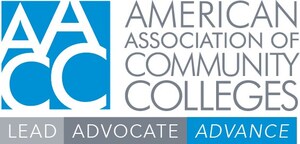
AACC Launches First National Comprehensive Accountability System For Community Colleges
VFA Will Revolutionize Community College's Ability to Measure Student Outcomes
WASHINGTON, Oct. 23, 2013 /PRNewswire-USNewswire/ -- In an unprecedented effort, the American Association of Community Colleges (AACC) today launched the first-ever national accountability system to measure how two-year colleges perform in serving their more than 13 million students. The Voluntary Framework of Accountability (VFA) has been developed for community colleges, by community colleges with measures that encompass the full breadth of the community college mission and the diversity of students' goals and educational experiences.
The VFA will give community colleges what has long been lacking in reporting outcomes to the public and policymakers: specific metrics that assess how they do in areas such as student progress and achievement and career and technical education programs (credit and noncredit).
"Many traditional measures of institutional effectiveness produce an incomplete or inaccurate picture of community college performance," said AACC President and CEO Walter G. Bumphus. "For example, most national assessments are pegged to full-time students, but the majority of community college students attend part-time. Given the increasing reliance on our colleges to educate the growing numbers of students to keep our nation competitive, it is essential that the public and policymakers understand what we do and how well we do it."
Community colleges can sign up for the first year of VFA membership and receive access to a fully online data tool with the ability to enter, upload, and visually display their data. Additionally, colleges will be able to benchmark their data against the data of similar colleges to more fully understand their own efficacy and areas of strengths and challenges. The colleges will have a significantly improved ability to assess their performance, identify areas for improvement, demonstrate effectiveness to local, state, federal and accrediting agencies, seek funding or respond to performance funding calls, and implement practices and policies to ultimately improve student outcomes. Join VFA at http://vfa.aacc.nche.edu.
The VFA measures were developed through 18 months of intensive research and testing by community college presidents, institutional researchers and trustees/governing boards that know data and understand our institutions and students. The measures gauge student progress and outcomes including pre-collegiate preparation (such as developmental education and Adult Basic Education), academic progress and momentum points, completion and transfer measures, and workforce outcomes for career and technical education.
Pennsylvania was first to adopt the VFA state-wide. "The systematic collection of student progress and completion data will enable Pennsylvania community colleges to be stronger advocates for advancing policy issues aimed at improving student access and success," said Dr. Karen A. Stout, president of Montgomery County Community College. Stout is a member of the VFA Planning and Advisory Committee.
In addition to the 140 colleges that beta tested the VFA system, numerous colleges are using the VFA locally. Michigan and Nebraska are reviewing a state-wide implementation of the VFA; Arizona and Texas have incorporated VFA into their reporting frameworks. Louisiana's Board of Regents agreed to include some VFA measures in its GRAD Act. Colleges in Illinois are considering the VFA in creating a 2014–18 scorecard, and Ohio is using the VFA as it works with its Board of Regents on performance funding.
On a national level, AACC has rolled the VFA's measures into the Student Achievement Measure (SAM) initiative, which is a joint project of the six national higher education presidential associations to provide the public with a more comprehensive measure of college student progress and completion. Additionally, the VFA helped AACC respond to the expansion of IPEDS outcome measures and the reauthorization of the Higher Education Act.
"We believe the VFA is the foundational accountability framework for our colleges now and into the future and we are committed to providing community colleges with the metrics that are most appropriate and truly reflective of our mission," stated Bumphus. "At AACC, VFA is a priority and the cornerstone of our strategy to meet national completion goals and respond to challenges identified in the report of the 21st-Century Commission on the Future of Community Colleges." (http://www.aacc.nche.edu/AboutCC/21stcenturyreport/index.html)
Generous funding to build and implement the VFA website and data tool has been provided by the Bill & Melinda Gates Foundation (BMGF).
Additional funding for early-stage development was provided by the BMGF and the Lumina Foundation in partnership with AACC, the Association of Community College Trustees, and the College Board.
The continued success of the VFA relies on participation and input from all community colleges. Please visit http://vfa.aacc.nche.edu to learn more and to join. Additional questions and feedback can also be submitted to: [email protected].
The American Association of Community Colleges is a national organization representing the nation's 1,167 community, junior and technical colleges and their more than 13 million students. Community colleges are higher education's largest and fastest growing sector, currently enrolling close to half of all U.S. undergraduates. For more information and a listing of community colleges nationwide, see www.aacch.nche.edu. For daily news about community colleges and key issues affecting them, sign up to receive the Community College Times at www.communitycollegetimes.com
SOURCE American Association of Community Colleges





Share this article